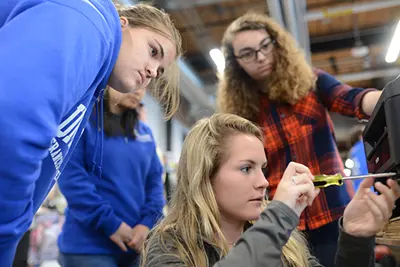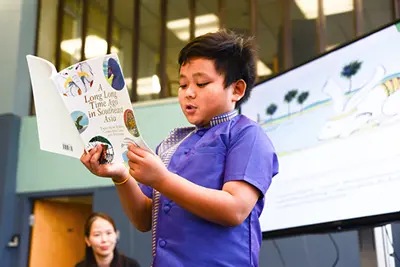Industrial Capstone Project Wins Green Design Award, Congressional Recognition
 Image by Ed Brennen
Image by Ed Brennen
09/06/2019
By Ed Brennen
A floating trash collector designed and built by Francis College of Engineering students to one day clean the city’s canals recently received a Green Design award from the Lowell Sustainability Council, along with a Certificate of Special Congressional Recognition from U.S. Rep. Lori Trahan.
Dubbed “Rover the River Hawk,” the Roomba-like machine is an ongoing Industrial Capstone Senior Design project sponsored by Enel Green Power, the company that manages the city’s canals. Three teams of electrical, computer and mechanical engineering students have taken turns working on the project since its inception in the fall of 2017.
Three of those students (now alumni) – Brennden Winton ’18, Vikram Laisetti ’19 and Andrew Garber ’19 – accepted the honors at the annual Sustainable Lowell Awards at City Hall. Capstone Coordinator John Palma, an assistant teaching professor of electrical and computer engineering, also attended.
“The capstone was a great experience,” says Winton, a mechanical engineering alum from Townsend who was among the first five students to work on the project. “I liked that it was a very open-ended, ground-up project. We just put our heads together and developed a design.”
 Image by courtesy
Image by courtesy
Winton says the work he did for the capstone – such as coming up with the project schedule and overseeing the construction – played a direct role in landing him a construction management job with Consigli Construction in Milford upon graduation.
“That’s what really sold them on my interview,” he says. “I presented my capstone project and said, ‘Here’s how I designed it.’”
Laisetti and Garber have had similar experiences.
“This project was really helpful for me in my industry,” says Laisetti, a computer engineering grad from Lowell who now works as a robotics technician at Vicarious Surgical Inc. in Charlestown. “I spent most of my time working on micro controllers, modules and circuitry boards, and that’s what I’m doing now at my company.”
“It was a really hands-on project,” adds Garber, an electrical engineering grad from Milford who now works as a signal engineer for HNTB in Chelmsford. “And it felt good to work on something to help the community.”
The project is a collaboration with Enel, the National Park Service, the Coalition for a Better Acre, Lowell Canalwaters Cleaners and DIY Lowell.
 Image by Edwin L. Aguirre
Image by Edwin L. Aguirre
Dohn Bowden, an assistant systems lab manager in the College of Engineering and the project mentor, says he’s proud of how the students have worked with the different groups.
“They were faced with real-life situations that needed to be resolved, and each time they developed a solution that was seamlessly integrated into the final design,” Bowden says. “It was a pleasure watching the engineers transform from students to designers, builders and testers.”
Roughly the size of a billiards table, Rover the River Hawk is designed to collect trash floating on the surface of the canals in two steel mesh cages.
The first group of students – Tu Anh Huynh, Willie Ho, Maya Cheriyan, Renan Campos and Winton – designed and built the prototype in the spring of 2018.
The second capstone group – Cameron Edmonds, Hans-Edward Hoene, Lior Osherov and David Tejada – attached two trolling motors that they programmed to be controlled using WiFi.
 Image by Ed Brennen
Image by Ed Brennen
The most recent group – Leontyne Robinson, Joseph Jean-Jacques, Emilio Eldakkache, Laisetti and Garber – added safety cages to the trolling motors, redesigned the doors to hold in the trash and worked on a mechanism to lower the boat into the canals.
Future groups will work on making the watercraft autonomous by purchasing cameras, ultrasonic sensors and distance and weather sensors. They will also write the code for autonomous mode and GPS localization.
While Enel provides funding and storage space for the machine, the company gives the students free rein on the actual work.
“We gave the students the problem; they come up with how to solve it,” says Enel Maintenance Planner Pat Donahue, who coordinates with the student groups. “It’s great. It’s no different than in the business world. You get students with different backgrounds and ideas, and they come up with solutions that you never thought of.”
“It’s inspiring to see six organizations come together and combine their energies into making something useful for cleaning our canals,” adds Jay Mason, chair of the Lowell Sustainability Council. “This project shows that we can join forces as a community and make progress on an important issue.”



